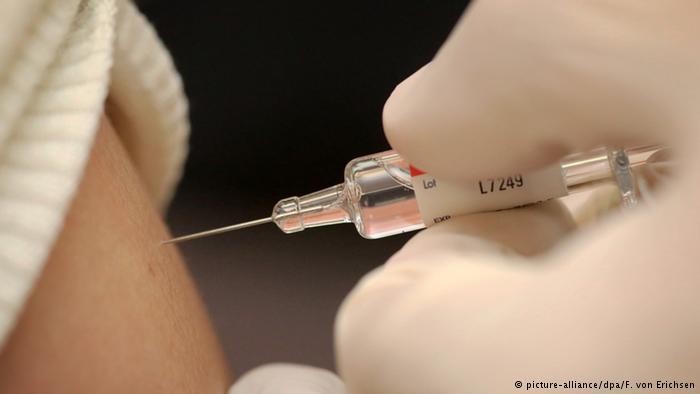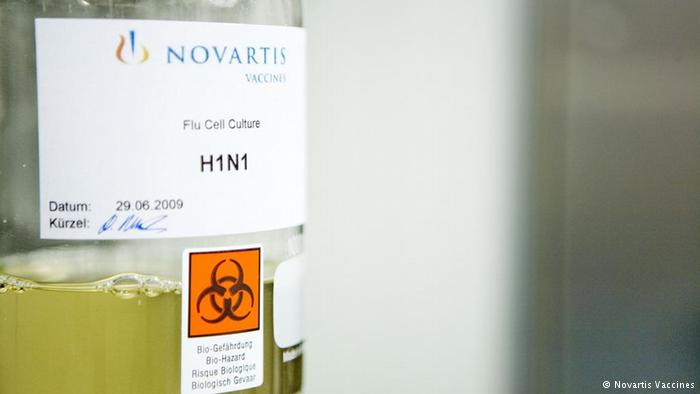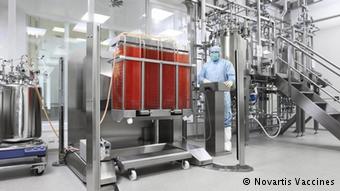Medicine
Many vaccines are currently sold out
Flu, Polio, and typhoid – many vaccines are currently not available. Germany struggles with supply shortages. Vaccinations must fail. This is not an isolated case, because vaccines are different than ordinary medicines.

The list on the website of the Paul-Ehrlich-Institut is long. With over 20 vaccines from different manufacturers is at the Moment a bottleneck. Hexal, Astra Zeneca, GlaxoSmithKline, Sanofi Pasteur and other companies may use one or more of their products no longer deliver.
By Definition, the Paul-Ehrlich-Institute is a bottleneck, if the substance longer than two weeks not in the usual scope can be delivered. This is new, because in the past few months. Some vaccines are according to the list already in the coming month is available again, other again only in January 2017. In some case the delivery is delayed “indefinitely”.
First things first: the fact That so many refugees arrive in Germany and be vaccinated, is not the bottleneck guilt, shared the Robert-Koch-Institut of the Deutsche Welle: “The shortages were to a large extent, even before the refugees.” There are also in Germany typical Reiseimpfungen, as a Kombinationsimpfstoff against typhoid and Hepatitis A.
Halb so wild
We now need to make our Impfsicherheit Worry? The press office of the Paul-Ehrlich-Institut waves: It was all not as bad as it looked. Flu shots, for example, “every year in December, generally, are not available anymore”, because that is Saisonimpfstoffe. A Five-fold vaccine for the immunization of children is currently sold out, but would be by the Six-vaccine – to protect against Hepatitis B contains replace.
What, exactly, it is that there is a current lack of vaccines is not known, says Susanne Stöcker, spokeswoman from the Paul-Ehrlich-Institut. Partly, there were problems in the manufacture. In General, but it would quickly become a bottleneck, if worldwide demand is increasing because more people in other countries according to the world health organisation vaccinate.
Pathogens need to feel comfortable
Difficulties in vaccine production are not uncommon. Regularly it comes to supply shortages. “Vaccines are natural products,” said Rolf Hömke, lecturer at Verband Forschender Arzneimittelhersteller vfa during a previous Research of the German wave. In the vaccine production go, it’s a matter living creatures to multiply and “because it can sometimes be the case that the harvest verhagelt.”
When a vaccination, the immune system is the defining characteristic of a pathogen, recognize and later recall. Vaccines consist therefore from bacteria, viruses, or characteristic Parts of them.

Vaccines: now and again in short supply
No matter what kind of vaccine it manufactures Without the propagation of viruses or bacteria in the lab, nothing. And that takes time, because not all pathogens multiply rapidly soon. In addition, scientists need to ensure that bacteria and viruses feel. You need the right nutrients, temperatures, and environmental conditions.
Doing so will change the exciter your preferences even as guests in a Hotel, explained Irene von Drigalski, then spokesperson of the Impfstoffherstellers Novartis Vaccines, in the context of a previous DW-Interview: “The one wants for Breakfast, a Fried egg food, the other prefers a hartgekochtes Egg. But it may well be that the first guest a year later, comes back and then rather a weichgekochtes Egg instead of a fried egg would have.”
Novartis vaccines now has his Impfstoffsparte at GlaxoSmithKline sold. Generally, vaccine manufacturers less rather than more, says Susanne Stöcker, from the Paul-Ehrlich-Institut. “The ratio of overhead to profit is in the manufacture of vaccines, in comparison to the ordinary production of medical drugs is ridiculous.” With vaccines, just doesn’t make a lot of money. To sensitive nature of the production process.
Multiply and multiply let
Bacteria can be directly into a culture medium in large vessels breed. Viruses, however, are by Definition not living beings, because they always have other cells for reproduction need. The manufacturers make vaccines against viral diseases is therefore often present in animal cells in Petri dishes. These cells attack the Virus, can you reproduce and at the end, scientists can produce pathogens from the Kulturbrühe win.

The first intermediate product for the manufacture of vaccines: a Kulturbrühe. From you have the virus is then extracted and then purified.
Vaccine manufacturers multiply the pathogens in cells. These cells, however, originate from only originally out people or animals. In the meantime, they are pure Laborzellen become, because they are so manipulated that you are like cancer cells almost unlimited parts.
Viruses infect such cells, but not by nature. The scientists you must first get used to it: With time, adapt to the viruses through mutations in the new host. “The art is, viruses to which can be found in these cells well proliferate, but they are not yet so far changed, that the vaccination is not more suitable,” explains Rolf Hömke from the vfa. Because then they would in the body will not have the desired protective effect cause.

So increasingly you Tollwutviren in the laboratory.
If the manufacturer once a suitable virus strain, you need to ensure that as little as possible further changes. The solution: Huge amounts of this Virus into portions to freeze and for each new production of a Portion of defrosting.
This is also the reason why vaccines are only ever batch-produced, and never continuously says Hömke: This can prevent that a once optimized virus strain further modified: “In almost all the vaccinations is the vaccine you get today, still almost the same as 20 years ago,” says Hömke.
For the garbage produced
The manufacturers have each Batch of a vaccine after the production test in detail: check to see whether it works, whether animals are in fact antibodies against the pathogens form. In addition, the vaccine generated a wide range of quality standards to meet: He must be absolutely clean and sterile.
It may happen that the desired immune response in the animal is missing, the vaccine unwanted side effects or is contaminated. “Then the producers sometimes have no other choice, as the entire Batch is dry and to burn,” says Rolf Hömke.
In the event it comes to delivery problems on the market. Because if after months it turns out that a Batch is spoiled, not just one more push. According to the vaccine manufacturer Sanofi Pasteur takes one production cycle, depending on the vaccine between six and 22 months, especially because of the extensive Tests and checks that are necessary.
But even if the production nothing goes wrong: If suddenly more people than in the past against a disease to be vaccinated want it comes to bottlenecks. The offer is simply not as fast the increase in demand, says Rolf Hömke: “You can’t get fast times on the copier to fire up, when a few copies more needed.”
